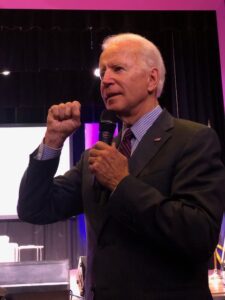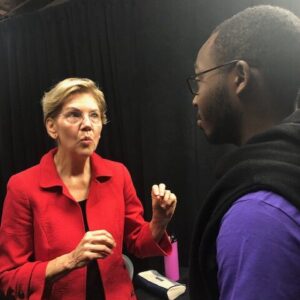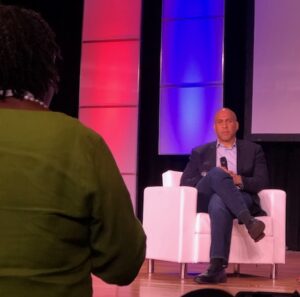
Photo by Bleu Bell
COLUMBIA, S.C. — In the wake of President Trump’s controversial visit to Benedict College on Friday, nine Democratic presidential hopefuls shared their thoughts on criminal justice reform at the 2019 Second Step Presidential Justice Forum, co-hosted by Benedict and the 20/20 Bipartisan Justice Center.
Most candidates echoed the same points, but South Carolina HBCU students and faculty were able to vote for the candidate they felt best addressed their concerns — the first-ever “HBCU straw poll.”
“The United States of America has 25 percent of the world’s prison population. Yet, we represent just 5 percent of [the world’s] population. Relative to where we should be as a country and relative to where other countries are, this has to be one of our top priorities,” said Maryland Rep. John Delaney, considered a long-shot for the Democratic nomination. “It has to be one of the main commitments of the next president of the United States of America and I bring you that commitment here today.”
Delaney did not mention Benedict College, a private HBCU, during his speech. He referred to it as “the college.”
Candidates in attendance included Delaney, Senator Cory Booker of New Jersey, Mayor of South Bend, IN., Pete Buttigieg, Senator Kamala Harris of California, Senator Bernie Sanders of Vermont, Senator Amy Klobuchar, of Minnesota and former Vice President Joe Biden, who all spoke on Saturday. Senator Elizabeth Warren of Massachusetts, former Secretary of Housing and Urban Development Julian Castro and Hawaii Rep. Tulsi Gabbard spoke on Sunday.
Each candidate was given the opportunity to interact with audience members on a variety of topics ranging from private prisons, marijuana legalization, the disproportionate amounts of incarcerated minorities, institutionalized racism, recidivism and more.
Although some Democratic candidates, were met with smaller crowds than President Donald Trump on Friday, the intimate setting in the school’s Fine Arts and Humanities Center allowed for a much-needed open dialogue.
One student from Benedict told Biden that she often finds herself nervous and afraid when a police car pulls up behind her, especially if she knows she has done nothing wrong. She asked him what advice he would give to her about what to do in this situation if she was his daughter.
“If you were my daughter, you’d be a Caucasian girl and you wouldn’t be pulled over,” he said, which was met with sympathetic nods and applause of approval.
While Biden used his allotted time to connect with students by leaving the stage and coming out into the audience, some candidates had a different approach.
Booker, for example, wasted no time in responding to Friday’s events and referencing President Trump’s various offenses against the Black community.
“He does have the support of communities like this that he actively demeans, degrades and disempowers. Just as when he took a full-page ad out in The New York Times calling for the execution of five innocent Black teenagers, just as he claimed that the first Black President of the United States wasn’t born in the United States and challenged his citizenship.

“This is the Donald Trump [that] blocked Muslims from entering this country, just like he did when he called majority Black and Brown countries [explicit]-hole countries … this is who Donald Trump is. His words show his truth,” Booker said.
Klobuchar also expressed her disgust in the president’s comments after the deadly white nationalist rally in Charlottesville, VA., in August 2017.
“I was actually appalled when the president, after Charlottesville, said that there were two sides. There weren’t two sides. There only one side: the American side,” she said.
Harris, the only HBCU graduate in the race (she attended Howard University), stressed marijuana legalization and getting rid of private prisons on her first day in office. She also discussed her comprehensive plan to pour $60 billion into HBCUs for infrastructure development, funding STEM programs and training entrepreneurs.
Harris had released a statement on Friday saying she was protesting the event and would not be in attendance due to Trump unjustly receiving an award she had once received in 2016. When she arrived she said it was because Benedict College students were excluded from the event.
Her arrival also came after an exchange on Twitter between Booker and American news commentator Van Jones where Jones accused her of “running away.”
“Running away from a conversation has never solved anything. Some people will abandon a microphone because they don’t like the person who touched it last. Others are smart enough to grab that microphone and make sure THEY get the last word,” Jones said in a tweet.

Photo by Bleu Bell
“There is a premium on being poor in this country …poverty is trauma inducing,” Harris said. “And when I think healthcare, I think mental health as much as I do a broken elbow.”
Sanders used his time to divert the conversation from criminal justice reform to other pressing topics such as canceling student debt, battling the NRA, making HBCU tuition free, climate control and immigration.
One student asked Sanders if he would allow for immigrants to enter the country with a criminal record.
“It depends on the record,” he responded.
Sanders noted that he will be reforming immigration through executive order on his first day of office.
Buttigieg discussed his Douglass Plan, a comprehensive and intentional plan specifically for Black America that will “dismantle racist structures.” Castro’s plans mostly focused on restorative justice, increasing training for officers and putting an end to over policing of communities of color.
Castro also spoke on reforming the foster-care system as it disproportionately and negatively affects Black children as well as the importance of having more Black teachers.
Gabbard, the first female combat veteran to run for president, stressed the importance of shutting down a zero-tolerance policy in schools and ending the pipeline from school to prison in minority communities.
All candidates agreed the war on drugs was disastrous for Black America and that the current criminal justice system is both detrimental to taxpayer wallets and the lives of African Americans.